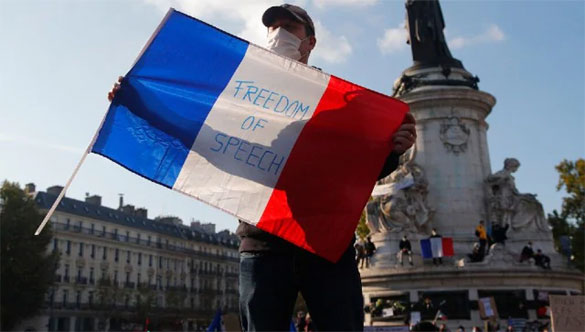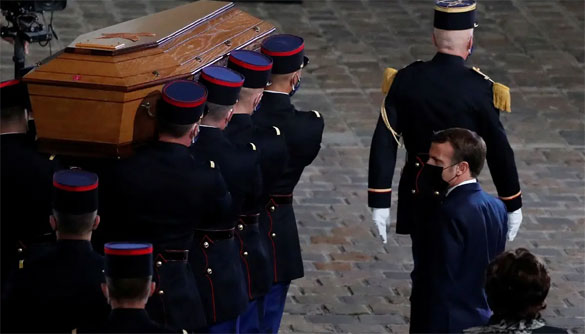
A placard reading “I teach so I am” and a portrait of history teacher Samuel Paty in the crowd of thousands of people who gathered on Place de la Republique in Paris on October 18th, two days after he
The beheading of a school teacher in France by a young Chechen immigrant has reignited fresh debate over the integration of Muslim minority in the country. Samuel Paty, the school teacher, had shown pictures of Muhammad’s cartoons in the classroom as a prop to start a discussion on freedom of speech. Enraged by this, some Muslims got together to teach him a lesson. It now appears that the plan to kill him has some connection with a Hamas-inspired French Muslim group. It has also come to light that the killer, Abdullakh Anzorov, paid 270 euros to two students who could identify the teacher. He told these students that he wanted to film the teacher and make him apologise for showing Muhammad’s cartoons. Anzorov was shot dead by the police shortly after he killed Samuel Paty in the most gruesome fashion.
Under President Emmanuel Macron, France has resolved to fight the scourge of ‘Islamic separatism’ and the proclivity of Muslims to live parallel lives without bothering to participate in ‘French values’. The French authorities conferred the highest civilian award posthumously on Samuel Paty as a sign that the country stands by his courage and conviction. It is rather rare for an entire country to stand up for a teacher and his ideas and the French must be commended for this.
It must be said that the act was inspired by certain teachings of Islam, which command its followers to kill anyone disrespecting the Prophet. This has been a long-standing tradition and in the hegemonic reading of Islam, there is consensus on this amongst different schools of law. What is also established within Islamic teachings is that a person who is accused of such a ‘crime’ has to be beheaded. That the Chechen youth not just killed the teacher but also beheaded him is ample proof that he was following Islamic command to its letter. France, like most modern societies, is at a loss on how to react to such medieval horror. The inventor of the guillotine itself is horrified at the return of such barbarity.
There is a section which seeks to understand such murder in the backdrop of the cartoons published by Charlie Hebdo. It is certainly true that some of the cartoons published by the magazine might be genuinely repugnant and offensive to some people. However, the way to counter such depictions is not by drenching oneself in blood. The proper way to react should have been to tell the audience how such depictions have hurt their feelings or to simply ignore them. By going all the way and killing the ‘offender’, Muslims are actually playing into the orientalist caricature as bloodthirsty people out to kill the infidels. Moreover, the cartoon appears to be just an excuse for committing such a crime. The real reason for this violence seems to be a particular interpretation of Islam that impels believers to commit such acts of violence.

The act of stabbing two Muslim women in retribution for the beheading of the French teacher should also be condemned by one and all. Mature societies do not react like this. But then, one should not forget that right wing politics is in the ascendant in Europe and it is foolish on the part of Muslims to give them such excuses to legitimise their politics. In this case, clearly the reason was provided by this Islamist Chechen and his handlers. But then, why should Islamists worry about the increase of right-wing politics in Europe when, in essence, they are also right-wing. Perhaps, the Islamists want the right-wing to come to power so as to prove that the world and, in particular, Europe is against Islam and Muslims.
The defence of blasphemy is essentially right-wing politics. Those who contextualise such targeted killing of individuals by pointing to increasing Islamophobia or by linking it to deprived social and economic situations of Muslims are wilfully mischaracterising this phenomenon. Killing over what is allegedly blasphemous is not just confined to European countries which are supposedly mired in Islamophobia and racism. But such killings are common in Muslim countries like Pakistan, Nigeria and Bangladesh. One certainly cannot argue that Muslims here are plagued by racism.

Moreover, such killings have widespread support amongst Muslims, and not just of the poor section but also of the middle class. One just has to see how the Pakistanis reacted over the killing of Salman Taseer and more recently of Tahir Ahmad Nasim. In both these cases, the murderers became heroes and were garlanded by the local Muslims. More than any extraneous factors, the politics of blasphemy has to be linked with certain hegemonic interpretations of Islam. One should also not forget that those who support retaining the provisions of blasphemy are the same who demand sex segregation in schools and public life, who reject the theory of evolution and who support the invisibilisation of women through compulsory wearing of the burqa.
Powerful groups within Islam have used this provision within the theology to silence critics and anyone who dares to think and write differently. Such politics essentially works as the locus of thought control within Muslim societies. It is not without reason that there is palpable fear within Muslim societies to say anything which might be perceived as being ‘out of the box’. Most, who have chosen to do so, have had to make the difficult decision of leaving their countries. Thus the politics of blasphemy is inherently supportive of an ideology which promotes status quo and subverts the development of any independent reasoning. The sooner this goes from the statute books of Muslim countries, the better it will be for the development of Muslim minds.
—–
Arshad Alam is a columnist with NewAgeIslam.com
This article was first published on NewAgeIslam.com
